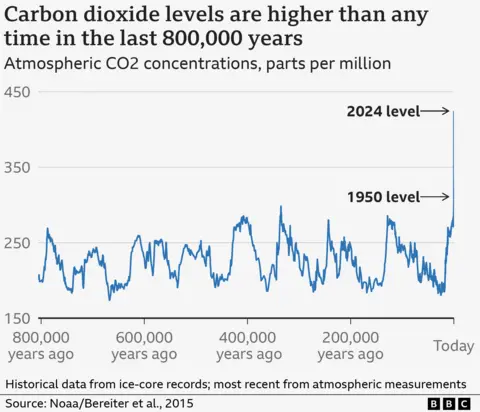President Donald Trump has again pledged to withdraw the United States from the Paris Climate Agreement, the world’s most important effort to address rising temperatures.
The first Trump administration took a similar step in 2017, but the move was immediately reversed on President Joe Biden’s first day in office in 2021.
Now the United States must wait a full year before officially withdrawing from the treaty. The White House declared a “national energy emergency” and outlined a set of changes that would reverse US climate regulations and boost oil and gas production.
It comes after global temperatures in 2024 rose more than 1.5 degrees Celsius above pre-industrial levels for the first time in a calendar year.
Although the Paris Agreement is not a legally binding treaty, it is the document that drives global cooperation to limit the causes of global warming.
President Trump’s dislike of this collaborative approach was echoed in his 2017 statement in which he said he was elected “to represent the people of Pittsburgh, not Paris.”
This temperature threshold was set in the Paris Agreement as a level beyond which the world would face extremely dangerous impacts.
The United States will now join Iran, Yemen and Libya as the only countries currently outside the agreement, which was signed 10 years ago in the French capital.
At the White House on Monday evening, Trump signed the order to withdraw from the Paris Climate Agreement, including a letter to the United Nations explaining the decision.
He also declared a “national energy emergency” to reverse many environmental regulations under Biden.
Trump called the Paris Agreement a “fraud” during a speech at Capital One Arena in Washington, D.C., after he was sworn in.
“We’re going to dig, baby, dig,” he said earlier in his inaugural address.
The new president also pledged that the United States would usher in a new era of oil and gas exploration.
“We will lower prices, fill our strategic reserves again, until they reach the top, and export American energy around the world,” he told the audience.
“We will be a rich country again, and it is the liquid gold under our feet that will help do that.”

However, fossil fuels in the United States are already flowing like never before.
Since 2016, US oil production has increased by 70%, and the United States is now the world’s dominant producer and exporter.
Likewise, LNG exports rose from almost zero in 2016 to the United States becoming the world leader.
The new administration says the president will also end the Green New Deal, a reference to the Inflation Reduction Act, Biden’s signature climate policy that directed billions to clean energy.
The president says he will also rescind efforts to promote electric vehicle ownership, what he calls Biden’s “electric vehicle mandate,” and advance efforts to save the U.S. auto industry.

It would also end the leasing of federal lands and waters to “massive wind farms that degrade our national landscape.”
Simon Steele, the UN climate official, said America risks missing out on a global clean energy boom worth $2 trillion last year.
“Its adoption would mean huge profits, millions of industrial jobs and clean air,” he said in a statement.
“Ignoring them only sends all this enormous wealth to competing economies, while climate disasters like drought, wildfires and superstorms get worse, destroying property and businesses, hurting food production nationwide, and inflating prices economy-wide.”
President Trump’s previous efforts to withdraw the United States from the Paris Agreement were a rallying cry for many Americans who were dismayed to leave.
Internationally, the US withdrawal has also served as a unifying force for countries.
But this time, the withdrawal could be far more damaging to global efforts to reduce emissions, as climate change has dropped to the bottom of governments’ list of priorities.
There are other countries, such as Argentina, that may follow the example of the United States.
Developing countries are also angry after the UN Climate Change Conference (COP29) in Azerbaijan when the wealthier world struggled to improve financing support.
But after surviving Trump’s previous attack, there is also a sense that this may not be the US’s last word on the Paris Agreement.
Simon Steele of the United Nations said: “The door remains open to the Paris Agreement, and we welcome constructive participation from any and all countries.”

